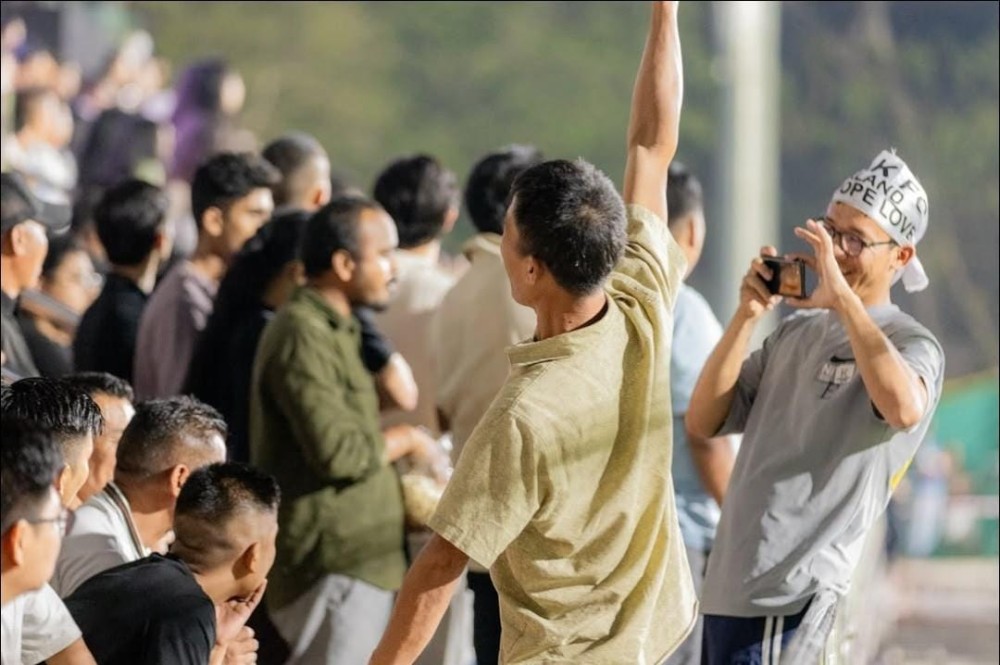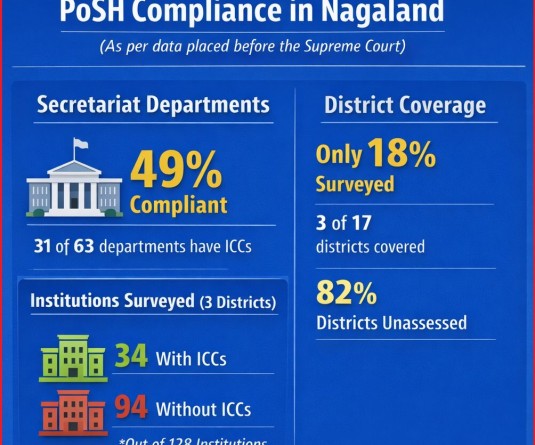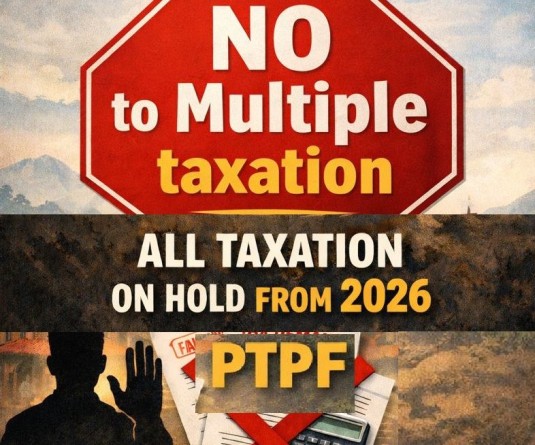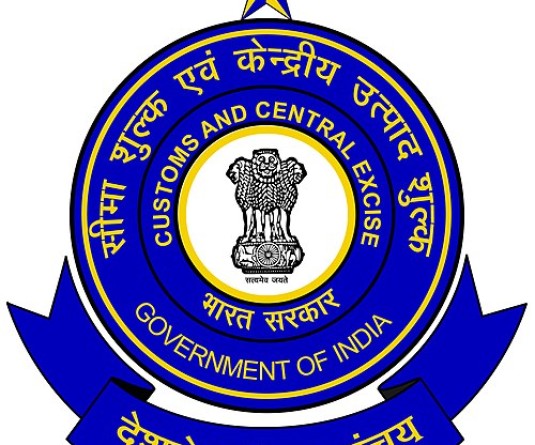A section of fans during one of the matches in the NSL. (Photo Courtesy: Talimoa Pongen)

Rebecca Kits Jakhalu
Kohima | April 1
When the inaugural season of Nagaland’s professional football league—the Nagaland Super League (NSL)—was announced, it stirred a wave of excitement, skepticism, and anticipation among local fans.
For years, football has been a passion for many in Nagaland, surviving on small-town tournaments and leagues and local football rivalries. But the idea of a professional league—one with structure, competition, and financial backing—was a dream long in the making.
For some fans, the creation of the league was a dream come true. “I’m extremely happy that our state could come out with our own league. It’s a dream for every football lover to have our own regular league. I would be happier if the duration of the league is longer. It would be too good to dream to have a state sponsored team to play in Indian Super League,” Niekhoto Curhah, an Assistant Professor from Kohima shared with The Morung Express.
“I would like to congratulate the Nagaland Football Association (NFA) for successfully organising the first season of Nagaland Super League (NSL) in a grand manner,” said Mhonbemo Kithan, an avid football fan from Dimapur.
Numbers that Speak
The first edition of the NSL set high records in live viewership, attendance, and ticket sales. The NSL YouTube channel amassed almost 25k subscribers since January 2025, and live matches had an average viewership of 12k, especially in the playoffs. The NSL announced it has become one of the biggest digital sports properties in Nagaland, with massive engagement across platforms.
“With 45 matches, over 4,050 minutes of play, and 140+ goals, the league has captured the imagination of thousands. More than 25,000 fans have turned up in both IG Stadium & Chümoukedima Football Stadium, and countless others have watched online,” the NSL’s official blog stated. “With over 25 thousand tickets sold, NSL has proven that Nagaland’s sports scene has real commercial potential,” it added.
“Nagaland as we all know has huge craze for football and it was evident when online tickets for playoffs and finals were sold out in minutes and even those with tickets couldn't even get entry due to overpacked stadium,” Kithan added.
Local talent on a big stage
“We’ve always had the talent, and now, we get to see it on a bigger stage. I think it’s the opportunity our state needs. We’ve got a lot of great players, and finally, they’ll get the chance to play at the level they deserve,” shared Ali.
Ali was not the only one excited about the prospect of homegrown talent rising to new heights.
“The inaugural season of the Nagaland Super League has been a breakthrough moment for football in Nagaland. It has brought our football scene into the national spotlight and is among the highest prize-money tournaments in India. The league has given local players a golden opportunity to display their talent on a bigger stage and has paved the way for them to progress to higher-level competitions. From the way it was conducted, NSL has already shown signs of professionalism, and with a few improvements, it can reach even greater heights,” said Benwangbo Pamai, an AIFF D License coach from New Jalukie, Peren.
Caution amid celebration
Some were cautious though, questioning the financial stability of the league and its long-term sustainability.
“Football is a big deal in this state, but can it support a professional league, especially when people have been without such a system for so long? Fans are flocking to stadiums to catch games or follow their favorite players, at least at first. But will they continue doing so, especially if/when more venues are added?” questioned a football fan from Kohima.
Online discussions also echoed similar concerns. Highlighting that the NSL has higher prize money than other state leagues, a Facebook user questioned whether the league would maintain quality.
“NSL season-1 cash prize is 20 lakhs for the champion and 15 lakhs for the runners up whereas Manipur state league cash prize is not even quarter of it. We can see how Nagaland is trying to make NSL season 1 itself a grand football league. Hopefully they don't back off after this season like it did with NPL previously when trying to make it way too standard than required,” a Facebook user named Tonwang wrote.
Sustainability and fair play
“Teams better watch closely. Many of the matches are played in front of empty stands. The prize money looks attractive but looking at the teams, their investment could be very high and only two teams will get the ultimate prize. If the league relies too much on government fund, the same thing that happened 12 years ago may happen again. There must be ticket and corporate sponsorship revenues to sustain not just the league but the teams. Free live streaming on YouTube is not a good idea for a ticketed event,” Kethosituo wrote.
“Currently, clubs are spending around `20,000 - `30,000(minimum) per player for just two or three months. Instead of this short-term investment, I believe the league should be extended for a longer period by minimizing player's salary cap, which will allow players to remain active and maintain their fitness levels. A longer league will also benefit clubs by ensuring that their investments in players yield better returns over time,” Pamai suggested.
Mixed matchday experiences
Some fans were eager to buy season tickets, sporting team colours and waving banners. Others preferred to wait and see how the league evolves.
With matches played at the Chümoukedima Football Stadium and the IG Stadium in Kohima, the response varied. Some matches had electric energy. Others, fans said, felt flat.
“Good atmosphere, good turn-up from the crowd (not IG Stadium, Kohima) and overall, a good experience,” one travelling fan observed.
“I feel that at the moment, Kohima is second only to Chümoukedima when it comes to fan attendance and match day experience; which I believe is because of the isolated location of IG Stadium and its multi-purpose nature which limits football stadium excitement to a certain extent,” said Bibemo from Kohima.
Calls for better officiating and youth focus
In terms of officiating, Kithan opined that partiality by officials should not be allowed under any circumstances. “Instead, raise the standard of officiating the matches, which, I believe, will automatically raise the standard of the tournament even more in the seasons to come. Long live Nagaland Super League!” he added.
“Talent is there, but the officiating needs consistency,” Albert Solo from Kohima shared.
A fan also noted that teams need a window month of pre-season to improve team coordination. “The beginning of the league saw a lack of team work,” he added.
“A suggestion to all the teams would be if they can set up their own academy to train and nurture young upcoming footballers instead of only depending on players behind their prime or recruiting excess non local players will really benefit the football scene in Nagaland,” Alex shared.
Youth development and structural suggestions
Commending the introduction of the mandatory rule requiring three U-20 players in a play/game, Pamai suggested increasing the number. Otherwise, many young talents may spend the season on the bench without match experience, he shared.
Pamai also recommended introducing a player auction system. “At present, the financially strong clubs are signing most of the star players, leaving other teams struggling for quality. If an auction system is introduced, players will be distributed more evenly among teams, making the league more competitive,” he said.
Fan Experience
The NSL’s organizers worked to keep fans engaged with music, entertainment, and local stalls. Merchandise sales surged, with jerseys, scarves, and memorabilia flying off the shelves, according to the NSL.
However, fans had concerns over the "no outside food" rule and sale of alcohol at venues.
“After a long day at work, I wanted to go, watch the game and enjoy with friends. But the unnecessary checking and confiscation of basic needs like water spoiled the mood. The organizers need to understand that people come to enjoy the games and not to worship…Perhaps this may be one reason as to why there were low attendance on match days,” Curhah opined.
“The rule of not allowing people to bring eatables inside the stadium is a commendable decision... However, once inside, varieties of drinks are available for purchase. This has led to disturbances in the stands, with some fans getting out of control. If left unchecked, this could lead to bigger security issues in the future. The organizing committee should take this matter seriously and introduce stricter regulations on the sale and consumption of alcohol or other drinks inside the stadium,” Pamai shared.
Looking ahead
In its roadmap, the NSL has tried to address most of the issues raised. Future goals include expanding to more teams and venues, collaboration with ISL clubs and AIFF, youth academies, bigger sponsorships, and enhanced stadium infrastructure.
While early opinions about the league have been mixed, one thing all fans agreed on: they were proud to witness something new and exciting.






